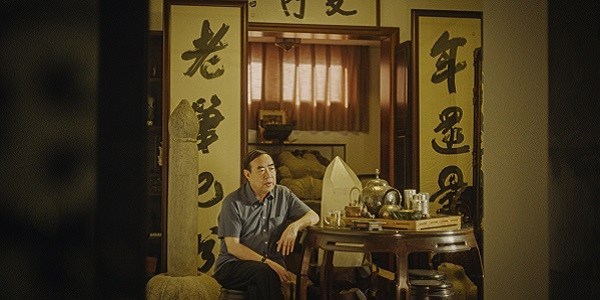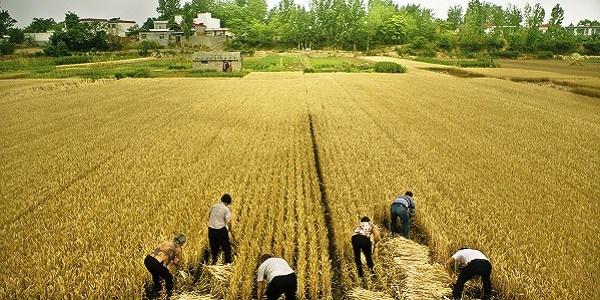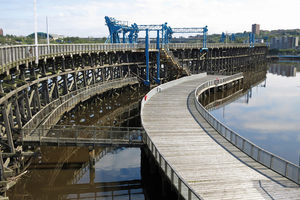NYFF 2020: SWIMMING OUT TILL THE SEA TURNS BLUE: Birthplace And Bloodland
Jia Zhangke is one of the most intriguing chroniclers of contemporary Chinese life in cinema today. His latest feature, Swimming Out Till the Sea Turns Blue, is his first documentary since his lyrical ode to the city of Shanghai, I Wish I Knew, was released in 2010. (That film was conveniently re-released and screened in U.S. cinemas for the first time ever earlier in 2020.) Yet it is clear that in the decade that has passed Jia has lost none of his talent for creating elegant yet perceptive nonfiction.
Using a literary festival co-founded by Jia in his native Shanxi province as the starting point for its sprawling journey, Swimming Out Till the Sea Turns Blue looks at four renowned Chinese writers — three living, one deceased — and the way their lives and work reflect the evolution of an entire country over the course of the 20th century.
“Writing Poetry Doesn’t Mean Living a Poetic Life”
The four writers featured in the film are Jia Pingwa (born in the 1950s), Yu Hua (born in the 1960s), Liang Hong (born in the 1970s), and Ma Feng, a writer-activist of the previous generation whose legacy has continued to be an influence after his death. In a structure that reflects the film’s literary leanings, Swimming Out Till the Sea Turns Blue is divided into 18 chapters with titles including “Love,” “Returning Home,” “Disease,” and “Harvest.” Just that small sampling should give you an idea of the wide range of subjects discussed by the three living authors, all of whom give lengthy personal interviews in the film.

One of the most remarkable things one realizes while watching Swimming Out Till the Sea Turns Blue is how this generation of writers who grew up during and in the immediate aftermath of the Cultural Revolution essentially had to resurrect Chinese literature on their own, almost from scratch, as so many of the books that came before them were either burned or banned during their childhood. Yu Hua tells us that when he decided to become a writer, he had to seek out short stories to learn from — not necessarily an easy task. Meanwhile, Liang Hong grew up in such poverty that her family could not afford the tuition to send both her and her older sister to school; Liang had to stand outside the classroom and eavesdrop in order to get an education. Now, she is a professor of Chinese literature at Renmin University in Beijing — a far cry from those humble beginnings, even if they have figured heavily in her work.

As each writer shares parts of their life story with the audience, we notice certain common features that arise time and time again. The most prominent? All of these writers spent their formative years in small villages, and the people and places they encountered there have served as major subjects of their work. “Villages are the reality,” one writer at the literary festival notes, and it’s hard to argue. To drive this point home further, Jia intersperses the interviews with the writers with footage of field workers putting aside their tools to stop and recite pieces of each writer’s work, emphasizing how beautifully and accurately each writer has portrayed the people and places they call home.
“We’re All Atheists; We Don’t Believe in Ghosts”
Swimming Out Till the Sea Turns Blue makes it clear that the role of the rural in the development of 20th-century Chinese culture cannot be overstated; indeed, we are told that Ma Feng did not find great success until he stopped writing about city life and abandoned the urban for the rural in both his life and his work. The tension between the urban and the rural continued to loom large throughout the Cultural Revolution, to the point that one had to register as one or the other type of household in order to determine what types of ration coupons one would receive. It’s no wonder that this dichotomy plays a major role in the work of the writers who grew up during that time, even as both rural and urban China have evolved over the course of the past century.
Because this is a film by Jia Zhangke, those field worker interludes are not the only poetic moments to be found in Swimming Out Till the Sea Turns Blue. Never one to stick to mere talking heads to tell his story — no matter how fascinating those particular talking heads might be — Jia’s signature impressionistic touches abound here, providing illustrations of modern Chinese life that contrast sharply with the film’s reminiscences of the past and highlight how much has changed. At one point, in a chapter fittingly titled “Journeys,” we’re taken on board a busy train where we watch people busying themselves with their phones as classical opera booms on the soundtrack. It’s hard to imagine a scenario further than the rural village where, in 1949, Ma Feng helped organize the residents so that they could irrigate the naturally salty earth and finally grow a wider range of crops than the three staples they had relied on for so long.

Towards the end of the film, Jia checks in on the next generation in the form of Liang’s teenage son, who has spent his life split between his mother’s hometown village, where he was born, and big-city Beijing, where he was raised. The river that runs nearby in the village is one he read about in his mother’s books, he says, but according to her, it has changed since then. Nostalgic for a time he has never known, he wishes out loud that he was able to ask his grandfather questions about what life was like during his time before he died. While his mother’s memories are captured on the page for future generations to absorb and imagine, his grandfather’s are lost to the ages. It’s a simple, sweet scene that manages to summarize a grand issue: the important role that literature plays in shaping a country’s past, present, and future.
Conclusion
An ode to the importance of art that is a work of art itself, Swimming Out Till the Sea Turns Blue is yet another fascinating look at contemporary China courtesy of Jia Zhangke.
What do you think? How many Jia Zhangke films have you seen? Share your thoughts in the comments below.
Swimming Out Till the Sea Turns Blue is screening as part of the Main Slate at the 2020 New York Film Festival.
Watch Swimming Out Till the Sea Turns Blue
Does content like this matter to you?
Become a Member and support film journalism. Unlock access to all of Film Inquiry`s great articles. Join a community of like-minded readers who are passionate about cinema – get access to our private members Network, give back to independent filmmakers, and more.
Join now!





